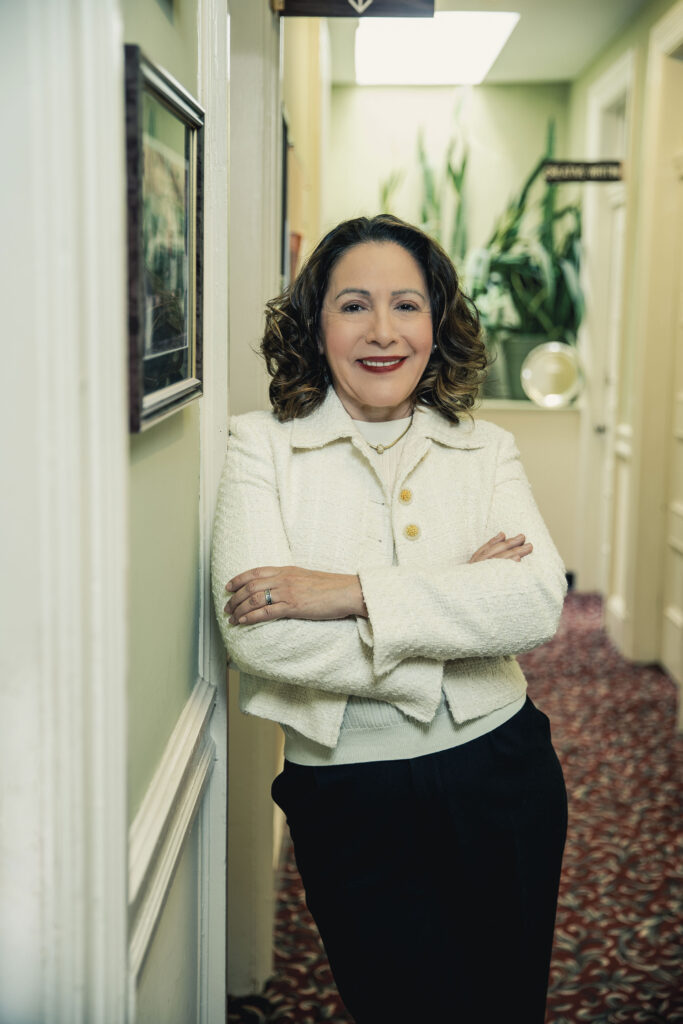A Life in Languages
Patricia Bazán, Professor of Foreign Languages and Literature, Florham Campus
By Rebecca Maxon
Patricia Bazán calls herself a duality. She’s lived in the United States for 42 years, following a childhood in Lima, Peru, but she still considers herself an immigrant. When she visits Peru, she is seen as a foreigner, “not only with the way I behave, but also with the way I speak,” says the professor of foreign languages and literature.

(Photo: Bill Cardoni)
Two is a formative number in Bazán’s life. Her undergraduate studies at New York University focused on the Italian language and on Spanish literature. She did her master’s in Peninsular literature (exploring the interactions between and conflicted development of different national traditions — a duality itself). And, her PhD covered both Spanish and Latin American literature.
“At an early age, I found that you learn about people’s ways of life, customs and even their prejudices, all through the study of their language.”
She started out at FDU as an adjunct and found mentors in Paul Rosenzweig, Don Guggenheimer and Barbara Salmore. “They taught me many things about academic life. I love the FDU community. It is immensely generous and supportive,” she says. She became an assistant professor of language in 1987.
“I’m proud that I adapted to teaching three generations of students. I’ve had Generation X, Millennials and now Gen Z,” says Bazán. “I particularly like teaching freshmen. It’s nice to see them grow and become adults as college life significantly changes them at all levels. It is just fascinating to see that enormous potential develop in only 15 weeks!”
Over the years, her interests have shifted, and she’s begun to focus on creative writing and self-publishing her work.
Cinco nébulas de obsesión is a collection of five stories. “My characters are defined by their duality. They live between two worlds — in this case the living and the dead — a common theme in Latin American culture.”
In her novella Lazarillo en Londres, a 16-year-old moves from Colombia to London, England, to have adventures and falls in love for the first time. Lazarillo means “guide,” and in the end he must help his love cross over into the unknown without fear.
Bazán likens this to her teaching, “Part of being a teacher is to guide students in the way I was guided as a student.”
In her current project, a Peruvian woman speaks to the ghost of her great-grandfather. “My grandmother used to tell us about my great-grandfather and his experiences in the War of the Pacific, from 1879 until 1883. As I grew up, the stories became ghosts to me. They wouldn’t leave me alone, so eventually I had to embrace them.”
Bazán’s students never leave her either. “Rest assured that our encounter was not accidental. When you meet someone — whether it’s a student, a friend or a perfect stranger — there is a purpose to that person in your life,” she says. “Every single one of my students has made a difference in me.”
COMING TO AMERICA
“My mother lived in Washington, D.C., and she wanted to bring my siblings and me here. She was able to get her papers so we could get our green cards.”
LITERARY INFLUENCES
Eugenio Cambaceres, a 19th-century Argentine writer about whom she wrote her dissertation; Edgar Allan Poe; Peruvian writer and poet César Vallejo; Horacio Quiroga; Clorinda Matto de Turner; and Franz Kafka
DESIGN DREAMS
“I love decorating! I am into inward and outward design: The space in which you move defines you and reflects your soul.”